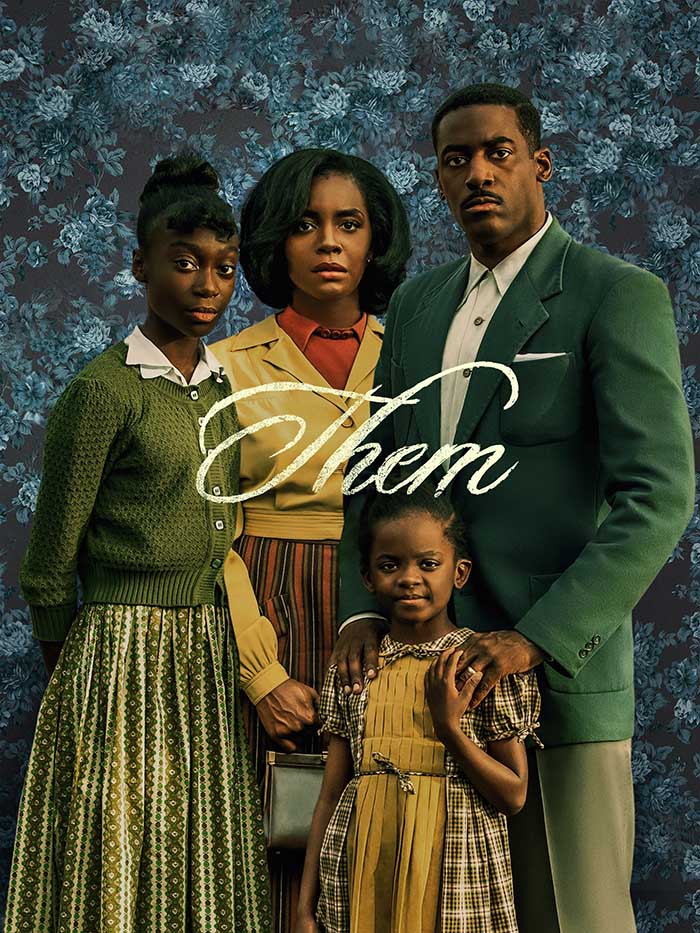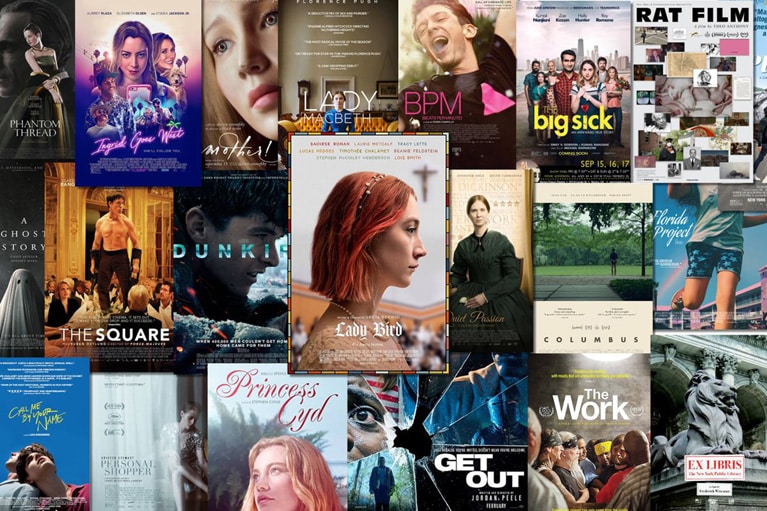In the first season of Them, created by Little Marvin, a reimagined Amazon Studios original anthology series, the story revolves around a Black family who moved from the South into the all-white neighborhood of Compton during the Great Migration in the 1950s.
The family consists of Lucky (Deborah Ayorinde) and Henry Emory (Ashley Thomas) and their two daughters, Ruby (Shahadi Wright Joseph) and Gracie (Melody Hurd). Even though otherworldly malevolent forces are threatening the family, the danger posed by their next-door neighbors is far more dangerous due to their willingness to resort to any means to maintain their way of life as they know it.
During this 1-on-1 phone interview with Collider, Ayorinde spoke about the poetic writing of Little Marvin, the difficulty of playing a character with so much intention, and how challenging it was to get through shooting Episode 5, the dynamic between Lucky and Betty (Alison Pill), what impressed her the most about the young co-stars who played her daughters, her reaction to the season’s end, and what she wants to achieve in the future.
Source: When this initially came your way, what was the pitch for it? Before you got to actually read any of it, what were you told about it and what did they say the show was going to be?
DEBORAH AYORINDE: It is difficult for me to describe what I am experiencing right now. The truth is that they didn’t tell me much about what they had to say to me. A few minutes ago, they sent me a copy of the script. Take a look at it, and you’ll see what I mean.
Astounded by how wonderful it was to read, I was blown away by Little Marvin’s writing when I first read it and surprised at how wonderful it was to read. As if it were poetry, it flowed like a river.
Additionally, I felt that Lucky was written with such a lot of intention, and I also thought that it was written very carefully and with a lot of dignity. I loved how she was portrayed and how rich and layered her story was. It is no secret that I advocate not only for women but also for Black women. I’d like to know where I can sign up.
This story is not only terrifying, horrific, heartbreaking, and important, but also quite difficult to watch. Is it clear to you that signing up for this will have emotional and physical repercussions?
AYORINDE: Honestly, I don’t think anyone can be able to do that. Honestly, I don’t think it’s possible to prepare for a journey thoroughly. I was aware of the most brutal scene I have ever had to do to date. This was the scene in Episode 5, where Lucky is attacked and raped, and her child is brutally murdered right in front of her while the victim is watching. Since I was aware of that scene very early on, I immediately began preparing for it when I was cast for the role.
There was no doubt that it would take every ounce of me and then some more. Even with all the preparation I had made, when we got to the day, no trial was enough to get us through. There was just no way I could resist jumping in. I am sure that is the truth. Anyone who has ever been through that, there is no way that you can prepare yourself for a moment like that, nor can you prepare yourself in advance. As honest as I can be, I am still affected by the scene that occurred.
Whether it’s the use of the N-word, references to apes, or Blackface imagery, there’s so much distinctly racist imagery in this. On a personal level, what was the most challenging thing?
AYORINDE: In my experience as a Black woman, I found the scene in Episode 5 to be the most challenging scene for me to perform. When racism and sexism collide obscenely, you can truly recognize the horror of racism and sexism. This is why Lucky is not just talking about racism; he is also talking about sexism at that moment.
As a black woman, I found this to be one of the most challenging things. This is because many people don’t necessarily understand that most Black women are fighting against both evils and not just one of them. Additionally, I felt honored to have been able to communicate that in such a raw and honest way.
To speak intelligently about racism, you must also be prepared to discuss sexism. This is because we don’t have the luxury of choosing one fight or the other when dealing with racism. It was such an honor to play Lucky in this film and portray that moment in that film. Even though it was a challenge, I was honored to be able to capture that moment for the audience.
It is more about the danger right next door than about otherworldly malevolent forces. In particular, how did Lucky and Betty’s relationship work out?
As I have discovered throughout my career, it is often the people who play the worst characters in real life who are also the people who are the nicest in their personal lives. That is probably because they are the nicest people I have ever met. I don’t know why, but they are.
It was apparent that we were not the people we were when we got into character and suited up. I do not doubt that this is just a statement that applies to women of that era anyway, but it takes so much effort to dress up, to become Lucky, or in her case, to become Betty, that when I looked at her in costume, I didn’t see Alison [Pill], I saw Betty. As you can see, it wasn’t hard at all. There is something funny about the fact that the evil forces do not even come close to putting a hurt on real people. It is way scarier to be around real people than to be around supernatural things. I found it very interesting to learn more about that, which made me interested in it.
It was the first horror I’d ever done, and I thought I would be more scared of supernatural entities than the people doing the evil they were doing that day. Still, I was more disturbed and terrified of what the actual people were doing.
The Supernatural force is never as scary to me as the perfectly normal person that does horrific things.
AYORINDE: This is my theory on the matter. As a result, when you interact with people daily, you assume they are humans, right? We are different from each other in many ways, yet we are all humans. In situations like these, you become aware of how evil people can be. This makes you terrified of the people you encounter every day if they allow that need for evil to become a part of their hearts.
The fear of what your doctor will do to you, the shopkeeper’s attitude, or the teacher’s attitude makes you dread a visit to the doctor. I am terrified to think about what people are suffering through and wonder what is going on in their hearts. As a result, I found them to be more terrifying than usual. Ultimately, human beings are supposed to be able to relate to one another. Because of this, I find it so disturbing.
What was it like to do the scene where you’re standing in the street with all of the neighbors and you’re screaming? Is that cathartic at all?
AYODINDE: Even though it was horrifying, it was also strangely cathartic at the same time. In our own lives, we experience that every day. We swallow it, and we bury it, and we show up, and we show up, and we never let up. We show up, and we bury it, and we show up, and we bury it, and we show up, and we inter it.
We show up, and we dispose of it, and we show up, and we dispose of it. We dig it up, dispose of it, and follow up. Microaggressions, racism, sexism, colorism, and all of the -isms we experience have a way of catching up to us, and so are the microaggressions we experience. I enjoyed playing Lucky.
This is because it has allowed me to uncover all the things I had buried from those experiences and just let them out. This project and this role were valuable to me because they gave me the freedom to be as unhappy, angry, unraveled, and needed. I was able to be. Lucky was granted full permission. That was a cathartic experience because it allowed me to let go. There was no doubt in my mind.
So much is required of the two young girls in this that play your daughters. What did you find most remarkable about working with Shahadi Wright Joseph and Melody Hurd?
AYODINDE: There is something funny about it: I realized I needed them more than they needed me. The two of us would have to do this heavy scene, and they would be backstage, doing TikTok videos and dancing while Ashley [Thomas] and I did the scene. The fact that they were basking in their innocence was just so refreshing to watch.
Although I was heartbroken, I knew there wasn’t much I could do to protect them from the things happening on the show. This is because I knew that their parents or I could only do so much to protect them from what was happening. In some form or another, they would experience it in their lives, even if they weren’t going to share it here on the set.
I found that to be the most challenging part of the process. There is something so remarkable about them. It was amazing to see how well they handled everything. It’s amazing how smart they are, especially Melody. She picked up a lot simply because she is so intelligent, even though we did not tell her much. There is no way to recreate the chemistry between them and the family connection. There is nothing I love more than those girls.



